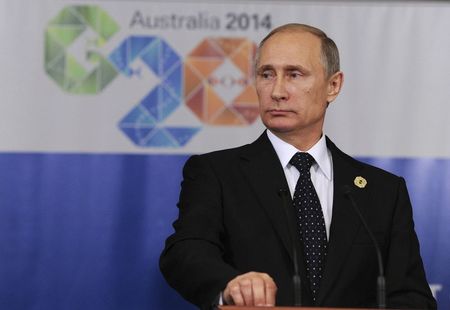By Erik Kirschbaum
BERLIN (Reuters) - Russia President Vladimir Putin said in a German television interview on Sunday that he is convinced it should be possible to find a way to resolve the crisis in Ukraine but added he was concerned about the threat of ethnic cleansing.
In the 30-minute landmark interview broadcast to a prime time audience, Putin defended Russia's annexation of the Crimea but also appealed to the hearts and minds of German viewers by saying relations between the two nations had never been better and saying it would be a shame to throw that away.
"Can one find a way out of this situation? Yes, I'm convinced there is a way," Putin said after criticising the Ukraine government for using force, rather than dialogue, against its adversaries in the east to trigger the crisis.
"I'll say this bluntly: we're very concerned that the desire could arise to use ethnic cleansing. We're afraid about a drift towards neo-Nazism. There are people with swastikas on their sleeves running around and armed forces with SS symbols on the helmets... That's why we fear there's a drift in that direction. It would be a disaster for the people in Ukraine."
Putin, who was once a KGB spy in Communist East Germany and speaks German fluently, was wearing a checkered dress shirt, dark jacket and grey trousers. German network ARD said the interview was conducted in Vladivostok on Thursday.
Putin, who spoke almost entirely in Russian and said he had made mistakes, believes Ukraine has a bright future, although it needs a framework so that all its minorities feel at home.
"It's a great nation with great people," he said. "But, you know, there's just one thing missing: an understanding that to be successful, stable and grow, everyone needs to have a feeling that this is their home no matter what language they speak - whether it's Hungarian, Russian, Ukrainian or Polish."
Putin said the annexation of Crimea was legitimate under international law and democratic because both the regional parliament and the people voted for it in a referendum. He said Russian troops were deployed to prevent bloodshed and added he was surprised by the reaction in the West.
"We consider the reaction to be completely inappropriate to what happened," said Putin, who appeared to be perspiring at times - as was the German interviewer - under the glare of the TV lights. "I'm firmly convinced Russia did not violate international law in any way."
Putin, whose position has many supporters in the formerly communist eastern region of Germany, said that he and Chancellor Angela Merkel are both working to calm the situation in Ukraine.
"It's in our interests ... and we'll look for a common solution and a common political framework," he said. "We're ready for that but it will only work jointly."
He was asked if he had made any mistakes.
"Listen, mistakes are always made - in business and private life," he said. "Everyone makes mistakes. But what's important is to react in a timely way, analyse and understand it was a mistake and then change the behaviour - and not get stuck on a dead-end street but work towards finding a solution."
Putin was full of praise for German-Russian relations. Industry leaders in Germany have been the strongest opponents of the European Union's economic sanctions against Russia.

"If you look at the atmosphere between Russia and Germany over the last 10 or 15 years, I don't know if there's ever been such a good period before. I don't think so. I think it's a very good foundation for developing not only bilateral relations but between Russia and the European Union and beyond that for global relationships. It'd be a shame to lose all that."
(Writing by Erik Kirschbaum; Editing by Eric Walsh)
